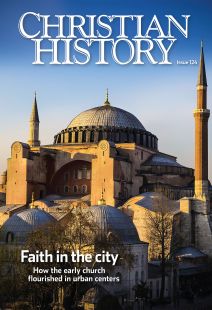“The transformative love of God in our lives”
It’s only a coincidence that I wrote this, my final post in my series on the kingdom of God, on the doorstep of Easter. But I might as well have planned it, because I want to propose a reversal of our inadequate models of the Kingdom that will bear some resemblance to death and resurrection.

[U.S. Capitol. Wikipedia/AOC.GOV ]
To equip Christians for whole-life discipleship, fruitful work, and wisdom about human flourishing, our churches need a fresh vision of the kingdom of God, transcending three inadequate visions that now dominate in different churches. Greg Thompson calls them the domination, fortification, and accommodation paradigms (in everyday language, we might call them culture-war, fundamentalist, and seeker-sensitive churches). I want to give up trying to articulate a single “right” vision of the kingdom and instead look at how churches in each of the three inadequate camps can grow by learning from the strengths of the others.
One thing I’ve considered is suggesting new, more constructive names for the three models. I want to tentatively suggest that these models could be called transformative justice, transformative holiness, and transformative grace, and that it is these three elements building upon their own strengths while striving toward one another’s strengths that represent the cosmic in-breaking of God’s transformative love. . . .
 Order Christian History #124: Faith in the City in print.
Order Christian History #124: Faith in the City in print.
Subscribe now to get future print issues in your mailbox (donation requested but not required).
Domination or culture-war churches, rightly enthusiastic for justice, could think of themselves as promoting transformative justice. Calling it “transformative” would force them to consider how real justice requires the local-church-based growth in personal holiness and the symbolically savvy cultural contextualization that the other two models point toward.
Fortification or fundamentalist churches, rightly enthusiastic for holiness, could think of themselves as promoting transformative holiness. Calling it “transformative” would force them to consider how real holiness requires sanctification and discipleship within (rather than apart from) the surrounding culture, as well as the constant emphasis on supernatural grace, that the other two models point toward.
Accommodation or seeker-sensitive churches, rightly enthusiastic for a cultural hermeneutic of grace, could think of themselves as promoting transformative grace. Calling it “transformative” would force them to consider how real grace requires the sacrificial calls to holiness and justice that the other two models point toward.
And if churches based on transformative justice, transformative holiness, and transformative grace were to learn to think and work together, seeking to learn from one another and self-sacrificially partner in enterprises that advance the Kingdom of God, that would really demonstrate what the transformative love of God—the love of the Father, Son, and Spirit for one another, extended to us in creation and redemption—would look like in our lives. If we took it seriously.
This article is from Christian History magazine #124 Faith in the City. Read it in context here!
By Greg Forster
[Christian History originally published this article in Christian History Issue #124 in 2017]
Greg Forster is director of the Oikonomia Network at the Center for Transformational Churches, Trinity International University. These reflections on Christians and culture are adapted from a blog series at The Green Room.Next articles
Faith in the city: Recommended resources
Here are some recommendations from CH editorial staff and this issue’s authors to help you understand the early church as an urban movement.
the editorsUnusual character
The Epistle to Diognetus describes the extraordinary character of early Christians
UnknownFood, Did you know?
fruitcakes, red eggs, jell-O, Christian fish, and communion machines
Thanks to those who contributed tidbits, including Kristen Roth Allen, Elesha Coffman, Suzanne Estelle-Holmer, Martha Manikas-FoSupport us
Christian History Institute (CHI) is a non-profit Pennsylvania corporation founded in 1982. Your donations support the continuation of this ministry
Donate





